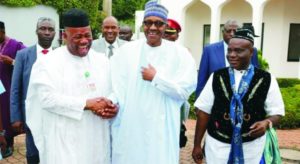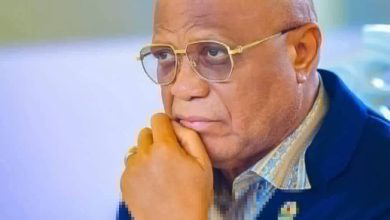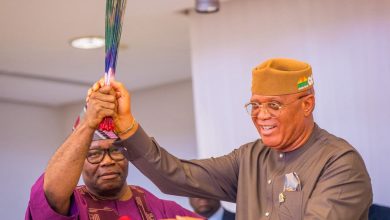
“NDDC must be allowed to remain under the Office of the Secretary to Government of the Federation (SGF). Don’t merge NDDC under Niger Delta Ministry. Niger Deltans shall no longer allow their interest to be subjugated and trampled upon by the Federal Government of Nigeria under whatever guise.” – South/South Mandate, a Coalition of ex-militants, Monday, April 26, 2015.
“Let it be put on record that if the NDDC is removed from the supervision of the Niger Delta Ministry to the Office of the Secretary to the Federation, we will carry on collateral damage on all available oil installations and facilities across the length and breadth of the Niger Delta region…not minding the negative impact our action would have on the nation’s economy” – Reformed Niger Delta Avengers (RNDA), Monday, September 1, 2019.
Although fundamentally related in practically every way – philosophy, geography, orientation and mandate – until about a fortnight ago, the Niger Delta Development Commission (NDDC) was an independent body from the Ministry of Niger Delta Affairs (MNDA), reporting to and supervised by Office of Secretary to Government of the Federation (SGF), Boss Gidahyelda Mustapha.
However, as part of his administrative restructuring, President Muhammadu Buhari during his 59th Independence Day Speech, Tuesday, October 1, 2019, announced that the NDDC had been moved to subsist in the Ministry of Niger Delta. Meaning that, henceforth, the Niger Delta Ministry, headed by former Governor of Akwa Ibom State and immediate past Senate Minority Leader, Senator Godswill Akpabio, will oversee or supervise the Commission. Interestingly, both the NDDC and MNDA were established by law by different administrations of Nigeria’s successive governments. While the former was created on 5th June, 2000 by the Olusegun Obasanjo administration, the latter came eight years after on 10th September, 2008, an initiative of former President Umaru Musa Yaradua.
Whereas the redeployment of the NDDC was not altogether surprising considering that there were rumours to that possibility, the merging nevertheless elicited questions and opinions on the possible implications of the redeployment. One, for what possible reason or how logical was the President’s decision? Two, which is better – the Commission being moved to the Niger Delta Ministry or to have been allowed to still remain under the SGF?
Some have questioned the merger as misplaced and seen it as additional load on the shrunken shoulders of the Ministry, an already belaboured and struggling entity neck-deep in blames of inefficiency and alleged impropriety. Some see it as a tactical move towards scrapping the NDDC. Some, still, are arguing that the merger will further weaken the ministry in terms of bureaucratic protocol, pace of work and execution of projects.
It must however be recalled that the NDDC was not the only entity forced to go under existing superior ministry. In the administrative surgery by the President, Ministry of Finance was merged with that of Budget and National Planning. Six new ministries were created: Ministry of Power excised from Ministry of Works and Housing; while Ministry of Transportation gave birth to Ministry of Aviation. Four brand new ministries created in the process were Ministry of Humanitarian Affairs and Disaster Management; Ministry of Social Development; Ministry of Police Affairs; and Ministry of Special Duties and Inter-Governmental Affairs.
Admittedly, the merging of the NDDC shall mean additional load to the parent ministry. But whether or not the President was aware of the grumbling in town over his decision to merge the NDDC cannot be said. But it was obvious not all saw the matter from the President’s spectrum. Because the proposal had been in the pipeline for long while, as far back as 2015, a faction of Niger Delta Youths had cautioned the President to shelve his plans, else the sleeping cheetahs would be let loose from their iron-cast cages.
Rising from a meeting in Warri, Delta State, April, 2015, the coalition comprising 26 youth and ex-militant groups under the aegis of South-South Mandate had vowed to resist any attempt by the President to collapse the NDDC under whatever excuses. They argued that such a move will lead to further suffocation of the NDDC from functioning in tandem with expectations, even at the snail speed it was already observed to be going.
In a communiqué signed by the Chief Convener, Mr. Victor Akpe, their grouse was that slicing the NDDC will amount to deliberate plans by the government to aggravate its already lukewarm administrative and operational situation. It will mean tying the Commission down with bureaucratic bottlenecks that would further hamper its functionality in terms of project execution, the NDDC being the closest interventionist agency close to listening to the poor and neglected people of the Niger Delta Region. “Niger Deltans shall no longer allow their interest to be subjugated and trampled upon by the Federal Government of Nigeria under whatever guise”, the release had stated.
They therefore demanded that the status ante be maintained for the sake of peace and progress in the region. Instead of merging the Commission, the youth rather asked the President to ensure all money owed the Commission by the Federal Government amounting to about 700billion then was released in the spirit of fairness, and henceforth ensure prompt release of funds due it.
However, in a counter-protestation, on Monday, September 1, 2019, the Reformed Niger Delta Avengers (RNDA), with a coalition of nine other militant groups threatened to bomb oil installations should the Federal Government fail to move the NDDC under the supervision of Ministry of Niger Delta. In a statement issued by the leader of the group, “General” Johnmark Ezonbi, aka Obama, the group contended that allowing the NDDC to remain under the SGF will continue be at the detriment of the Commission and those it was supposed to serve, the Niger Deltans.
They placed part of the blame to temper with the symbiotic relationship existing between the NDDC and the Ministry of Niger Delta at the doorsteps of those they called, “some power-drunk and self-centred leaders from the region, who have lost control of the affairs of the NDDC…collaborating with some top officials in the Presidency to situate the supervision of the NDDC in the Office of the Secretary to Government of the Federation (OSGF) in a bid to divert the fund for their personal gains towards 2023”. Plainly, the group insisted, the NDDC must be moved to Ministry of Niger Delta, else, they “will bring the nation to its knees and return Nigeria to another era of recession if the Secretary to the Federal Government and so-called selfish, self-centred, greedy, power-drunk politicians refuse to stop their evil arrangement”.
Interestingly, President Buhari did not allow the official or personal reason for the merger to be a matter guesswork for too long. Speaking at the maiden get-together/Federal Executive Council (FEC) meeting at the Council Chamber of the Presidential Villa on Wednesday, 11th September, 2019 since after being sworn in on May 29 for a second term, about three weeks after the inauguration of his new cabinet on Wednesday, August 21, 2019, the President said merging some ministries or parastatals was an administrative necessity and strategy for efficiency in service delivery.
“I expect you all to redouble your efforts in this second term. To enhance service delivery, we decided to restructure some functions which led to the creation of new ministries to achieve our goal of economic diversification and inclusive growth”, he had reasoned. He would emphasize on this discreet modality in line with his Next Level expectations in his 59th Independence Day broadcast. “The recent deployment of the Niger Delta Commission from the Office of the Secretary to the Government of the Federation to the Ministry of Niger Delta underscores our commitment to enhance the living standard of our communities in the Niger Delta, through coordinated and appropriate programmes”.
In truth, the idea for the restructuring of MDAs was not entirely that of Mr. President. The initiative was originally mulled in the former President Goodluck Jonathan administration, when in 2012 he set up the Presidential Committee on Rationalization and Restructuring of Federal Government Parastatals, Commissions and Agencies, headed by the then Head of Service, Stephen Osagiede Orasanya; hence the Steve Orasanya Report. By then, there were 541 statutory and non-statutory parastatals, commissions and agencies.
The Committee’s recommendations, which were contained in a 800-page report submitted to Goodluck Jonathan, proposed scrapping of 102 statutory agencies from 263 to 161, abolition of 38 agencies, merger of 52, and reversion of 14 to departments in the ministries. The Committee also recommended the removal of all professional bodies/councils from the national budget, linking of the budgetary system to deliverables and output, as well as urged government to vacate all decisions taken on past reports. Most memorable perhaps, was the Committee’s recommendation for the scraping of the Federal Road Safety Commission (FRSC), the Economic and Financial Crimes Commission (EFCC), and the Independent Corrupt Practices and Related Offenses Commission (ICPC).
White Papers on the status of MDSs date back to 1975 when the Gen. Gowon administration called for an audit or review of structure of government ministries. There were also in not too remote times the Allison Ayida Report (1995); Ahmed Joda Panel White Paper in 1999/2000; T. Y. Danjuma-chaired Presidential Advisory Committee (PAC) of 2011; and the Adoke and Ahmed Fika sub-committees. The aim, as was argued, has always been to downsize the workforce infiltrated by ghost workers of over 45, 000 in MDAs alone, checkmate overlapping and duplicity of duties, and reduce the country’s average cost of governance which ranked the highest in the world
It must however be added that, whereas the ex-militants and associated bodies as stakeholders in the Niger Delta should be commended for their concerns for the region, empty and needless threats must not always be deployed as weapon of engagement in pressing home their demands. Else, they could be mistaken by the authorities as using that merely for monetary pacification at the behest of politicians.




